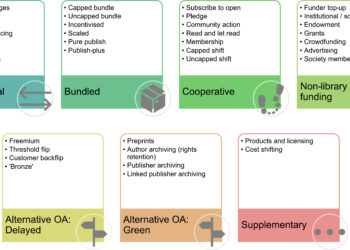
- Image via Wikipedia
When Chris Anderson popularized the concept of the “long tail,” Amazon.com was what he had in mind. In fact, a research paper in 2000 studied book buying habits on Amazon and yielded the data that helped to inspire the concept.
Now, the same researchers have updated their model and data, and find that Amazon’s long tail has become longer still. In a precise and analytical style, they describe why this has come about:
. . . . the same forces that created Amazon’s Long Tail in the first place may continue to make it longer over time . . . . First, exposure to niche products could drive consumers to develop a taste for more niche products. Second, by gaining access to “long tail” markets to stock their products, producers could have an increased incentive to create more new niche products over time. Finally, technologies that can drive consumers to niche products — such as search tools, product reviews, product popularity information, and recommendation engines — could improve over time, and consumers could become more familiar with these tools.
The economic implications of this are not lost. Consumer surplus (the economic benefit that accrues to consumers because they get things at a lower cost than they’d otherwise be willing to pay) is generated as books proliferate and prices fall. This abundance of books becomes addressable through search and online shopping. As the authors state:
. . . according to Books in Print, the number of books in print has increased from 2.3 million in 2000 to 3-5 million in 2008. Second, book industry revenue has climbed from $24.6 billion to $37.3 billion. Third, the share of book purchases through the Internet channel has risen from 6% in 2000 to 21-30% in 2008.
This new study covers 2008 sales, so it doesn’t touch on the fast-growing realm of e-books, which certainly is stretching the tail while increasing the market share of online bookstores, especially Amazon.
In conducting this new study, the researchers had access to a much larger sample. Testing this, they improved their model of the long tail, which revealed that “book sales decrease at an increasingly faster pace, as we move from popular books to niche books.” Essentially, the long tail generates fewer sales than their previous model would have suggested, and the difference is startling. Using the original model, books ranked above 100,000 would have been estimated to account for 82.57% of Amazon’s total sales in 2008; however, with the new model, books ranked above 100,000 account for only 36.7% of the total. As the researchers state dryly:
This finding suggests that there may be forces that limit Amazon’s ability to sell books that are extremely niche.
Essentially, the long tail is a real phenomenon, but not as powerful a force for commerce as we’ve been led to believe. The real change is being driven by the shift from bricks-and-mortar booksellers to online retailers.
And this recalculation of the tail matters, especially as regards the Google Books settlement, which is coming under some scrutiny once more thanks to a piece in the Stanford Technology Law Review. The author, Eric M. Fraser, analyzes the 140-page settlement as it sits still before the US Department of Justice. The question: Is Google on the verge of monopolizing e-books?
The same trends that are extending Amazon’s tail seem poised to feed a Google-centric e-book strategy — search, emerging consumer preference, pricing advantages, and so forth. But while Amazon has gained traction the good old-fashioned way — with a superior customer experience — Google’s approach smacks of a market approach based on monopolizing orphaned and niche content in an emerging format.
However, without best-sellers to drive the peak at the left of the sales curve, Google Books will be relying on a long tail strategy. Given this new research, both the risk to publishers and the benefit to Google may be much smaller than originally thought.
So, while the long tail at Amazon grows, Google may be left in the situation of the predator who thinks it has caught a lizard. It will feast on the tail while the lucky lizard scurries away to quietly grow a new tail, an appendage the predator won’t ever taste.
(Thanks to David Crotty for the link that prompted this post, and to Joe Esposito for a timely conversation about the long tail paper.)
Discussion
7 Thoughts on "Modern Book Sales: Amazon’s Tail Gets Longer Just as Google’s Mouth Opens"
Google can likely afford to rely on a long-tail strategy, given that book sales are merely a supplementary revenue stream for them. It’s important to remember that they are in the advertising business. They make their money from selling ads. Generally they’ve done this by giving away as much content for free as possible. Here, they’ll be giving away search content as usual, but adding greatly to the amount of content against which one can buy ads. So it’s an immediate win for them regardless of whether they actually ever sell a single book.
But getting back to the long tail, it’s only a business model that works if you’re selling in enormous quantity. Given Google’s reach, they may sell enough to make the tiny bits of income from the one-sale-a-decade books worthwhile.
The long tail, however, is a terrible place to be if you are a content creator. As posted recently in our Twitter feed, these two articles talk about the shift in thinking for online creatives, the realization that the long tail is a ghetto from which one must escape if one hopes to make a living:
You’re absolutely right, and I’m kicking myself for forgetting that Google’s reason for being is to index the world’s content. It’s why they’ve done maps, satellite images, street view, etc., and ads are a certain way for them to commercialize these endeavors. Thanks for noting this.
I’ll tell you, if I can ever find a correlation between “degree of difficulty” and “judge’s score” in blogging, I’ll be very happy indeed.
How has Google monopolized “orphaned and niche content in an emerging format”? Nothing is stopping anyone else from scanning the same books as Google as. It may not be economical for another entity to do it, but neither Google nor anybody else is stopping such an endeavor.
Amazon too has a “market approach.” They are both companies legally required to maximize shareholder value; they both have market approaches. That’s how companies earn revenue, by playing in the market.
Monopolies work by creating market concentrations others have difficulty overcoming. Microsoft has been under anti-trust scrutiny not because other people can’t offer OS solutions, but because Microsoft was making people nervous about tying up the market through various tactics. You’re answering your question when you say “it may not be economical for another entity to do it.” That’s how monopolies work.
Forget about the economics, it’s actually illegal for anyone else to do what Google is doing. Technically, it’s illegal for Google to do as well, but they’re using the proposed settlement as an end run around copyright law.
Quoting an article that covers the piece linked above:
The settlement allows Google to do things that no one else can reasonably expect to ever be able to do. That’s because the only way any other potential competitor for Google Books could reach the agreement it has with publishers–a class action agreement that gives Google default rights to all books ever published in the U.S. unless the holder of their copyright contacts Google to opt out–would be for that competitor to do what Google did: illegally scan the books and then hope for a good outcome when slapped with a class-action suit by all the country’s publishers.
This means that under the current settlement, there is no reasonable expectation that a competitor to Google Books will or could ever arise.
Speaking of monopolies, here’s a graphic view of Google’s share in a variety of markets along with some historical information on past monopolies:
http://www.scores.org/graphics/monopoly/



